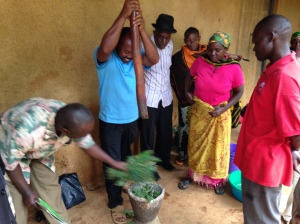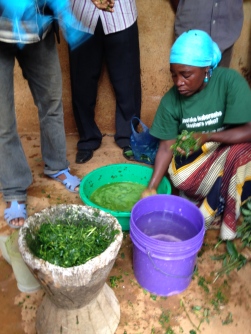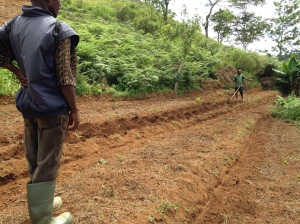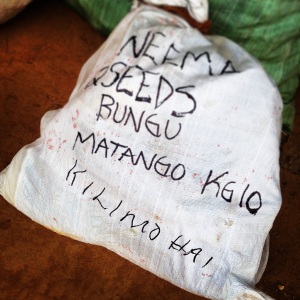Over the last four months, Grace and I have been implementing a plan to transition Partners in Bungu from traditional farming methods to organic practices. Growing organic vegetables (we’re planting onion, green pepper, and cucumber) means our farmers can get their products into fancy expat markets, namely in Dar es Salaam, and receive higher prices for their crops. Growing crops organically also means Partners can reduce the amount of money spent each month on agricultural inputs (i.e. pesticides, herbicides, fertilizers). The organic inputs they use can be sourced cheaply in and around Bungu and can even be found growing in the wild (such as utupa trees whose leaves can be squeezed to render a juice that serves as a pesticide). The opportunity to sell organic crops at higher prices coupled with reduced costs for monthly inputs will allow Partners to grow their earnings exponentially (Mungu akipenda!).
It’s important in each 2Seeds project that initiatives are driven forward by our Partners. Therefore, switching to organic farming practices necessitated putting someone at the helm, someone who could guide other group members in the ways of kilimo hai (organic agriculture). Bungu Partner Mngoma was elected to fill this position. During one of our weekly Monday meetings, Partners unanimously elected him to be the Bwana ya Kilimo Hai, and he gave an acceptance speech that was fit for the Academy Awards. Mngoma has been with the Bungu Project for about two years and is one of our most skilled farmers. He was also part of the organic cucumber trials we held last spring, so he has a great deal of knowledge about organic best practices. Throughout the last few months, he’s been an invaluable asset in our transition to organic agriculture.
So what has the Bungu Project’s transition to organic agriculture looked like exactly? Our timeline has unfolded like this: In November we elected Mngoma to spearhead organic operations. In that same month we also held refresher trainings on organic pesticide, herbicide, and fertilizer preparation.
In December, we visited each Partner’s shamba (farm plot) to map out areas that would be dedicated solely to organic agriculture.
We then devised a new planting calendar to gradually rotate in the planting of organic cucumbers. During January, we worked closely with Mngoma and our local agricultural extension officer to monitor and evaluate these starter crops. When February came, Bungu’s first organic cucumbers came into bloom, allowing us the exciting opportunity to harvest and sell our first kilos at a farmer’s market in Dar. This first sale was a huge point of pride for everyone involved.
The next steps for Bungu’s organic agriculture include: rotating in other organic crops to the planting calendar (onions and green peppers), with the hope that Bungu will exclusively be growing organic crops by the end of the summer; finding new markets for our specialty crops; embarking upon a regional campaign to educate market sellers and consumers about the environmental benefits of cultivating organic produce; as well as continuing to monitor and evaluate organic best practices.
Stay tuned over the coming months to see how the rest of our organic activities unfold!
-Whitney





